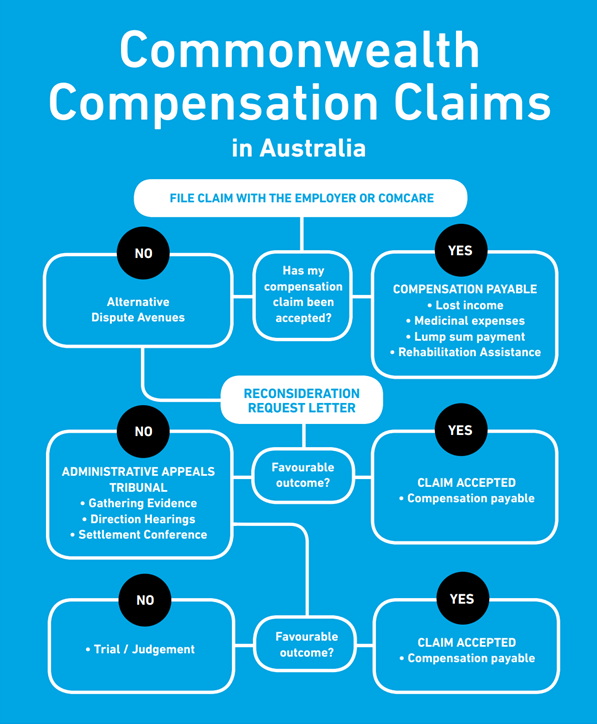Comcare claims – 5 top things you need to know!
 Having helped Commonwealth employees with work injury claims for well over two decades, I continue to see trends with disputed Comcare work injury claims. I thought it might be helpful to share the top 5 areas of dispute I regularly see with Comcare claims.
Having helped Commonwealth employees with work injury claims for well over two decades, I continue to see trends with disputed Comcare work injury claims. I thought it might be helpful to share the top 5 areas of dispute I regularly see with Comcare claims.
1.Claims denied on the basis of a pre-existing condition or pre-existing degeneration
A common approach taken by Comcare is to deny a claim based on them claiming that it is a pre-existing condition or that there is age related degeneration. Regardless of your age, if your work duties or a work incident has aggravated or exacerbated pre-existing degenerative changes, then you have sustained a work injury. The law is very clear on this point, yet it is a common basis upon which claims are denied.
A common example of this is where a person experiences increased pain in a particular body part due to work duties. If that experience of pain is at a greater level or is occurring more frequently than it did previously, and a work incident or your work duties contributed to that change, then you most likely have a work-related aggravation or exacerbation claim.
2.Refusing payment of medical expenses or only paying for limited periods of time
Comcare is liable to pay for reasonable medical treatment associated with any accepted work injury. There is no set period of time during which those expenses are paid. Provided the treatment is reasonable, and it is supported by medical evidence, these medical expenses should be paid by Comcare for as long as they are required.
If a medical treatment cost is rejected outright by Comcare you are certainly entitled to dispute that decision.
Often treatment costs are denied by Comcare, despite the treatment being beneficial in reducing your symptoms or improving your function.
On occasion, Comcare will only agree to pay for medical costs for closed or set periods of time. Again, if the medical evidence supports ongoing treatment, as opposed to treatment for a limited or specific period of time, that decision can be disputed.
If you believe that ongoing treatment is of benefit, you are able to agitate that position.
3.Denied psychological claims
Unfortunately, psychological claims can be complex and difficult to have accepted. This is due primarily to the additional criteria that applies in the legislation compared to what must be fulfilled for work caused physical injury.
Under the legislation a psychological claim can be denied if it has been caused by reasonable administrative action (RAA). What constitutes RAA has been given a very broad interpretation. It includes things like performance reviews, coaching, denial of a promotion or transfer, denial of a benefit related to work, a direction given by a supervisor and many other administrative directions.
A key aspect to challenging a rejected psychological claim involves determining if the administrative action was undertaken in a reasonable way. Was it done in accordance with the relevant procedure outlined in applicable policies? This involves a close assessment of what occurred factually prior to the injury being sustained.
The recent presumptive legislation applicable to PTSD conditions clearly provides a more readily available avenue to having that condition accepted as being work-caused. However, it is only applicable to PTSD that arose or was significantly aggravated by work duties after the commencement date of that amending legislation.
4.Denied Permanent Impairment (PI) payments
If you have sustained a permanent impairment of 10% Whole Person Impairment (WPI) or more, you are entitled to a lump sum payment. This is an additional benefit over and above medical expenses and any weekly payments that have been received. This payment is not taxed.
Comcare usually will not make you aware of this potential payment so you will need to initiate it yourself. There are numerous forms to complete and medical evidence to obtain when making such a claim.
If you do not meet the 10% threshold then there is no amount payable. The higher your PI assessment, the greater amount of compensation payable. For a 10 % WPI assessment the amount payable is roughly about $50,000.
5.Denied claims
Comcare can use a variety of reasons to deny a claim from its outset.
A work injury can arise from a specific incident or the nature of policing duties over a prolonged period of time. It is not necessary to have had a specific incident occur in order for a claim to be accepted. It is often more common that an injury occurs due to duties that are performed over a prolonged period of time. This is particularly the case with physical injuries to the spine, legs and arms. Indeed, an injury could occur from wearing or using particular equipment over a prolonged period of time.
If a claim has been denied, it is important to obtain medical evidence to challenge that decision.
Does the process to challenge a decision made by Comcare take a long time?
No, it doesn’t necessarily take overly long to resolve, depending on what you are disputing. Most disputes are resolved within a few months.
If the decision has been made to reject your claim or an expense associated with it, the first step is to request a reconsideration. Requesting and obtaining a reconsideration decision should only take a few months. If you still dispute the reconsideration decision, that can then be appealed to the Administrative Appeals Tribunal (AAT). It can take up to about six months to resolve a matter at the AAT. If you are successful at the AAT, most or all of the legal costs you’ve incurred should be paid by Comcare.
The below diagram outlines the claims process so you can have a better understanding of what to expect.
Summary
The legislation that applies to Comcare claims provides you with certain entitlements and a right to dispute decisions made by Comcare. Decisions can be made in an arbitrary way, and you have legitimate and broad avenues through which to challenge those decisions.
Seek out help early as it is usually easier to resolve a problem in the initial stages, and there are time limits that apply within which to dispute decisions. Be informed about your rights and options and seek professional help from a lawyer that specialises in Comcare injury work.
Tim White is a Partner at TGB Lawyers with significant experience advising and representing Commonwealth employees injured in the course of their work. Get in touch with Tim for a free initial chat about your matter and how TGB might be able to help you. You can find out more about TGB’s Comcare Claims experience here.
Tim White – 1800 730 842, twhite@tgb.com.au
